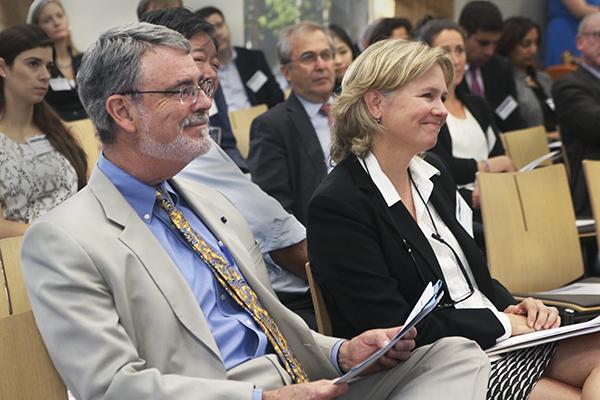Faculty from six different schools are coming together to remix the health care industry.
The GW Health Workforce Institute, which formally launched at an event Thursday, will unite researchers and staff from primarily the Milken Institute School of Public Health, the School of Nursing and the School of Medicine and Health Sciences in an effort to fill a gap in an area of research that many members of the group think is lacking in content.
The institute will focus on organizational issues impacting nurses, doctors and other health care professionals: incorporating technology into health care, prioritizing teamwork and ensuring employees are equitably distributed across regions, rather than in large cities.
While the institute will mostly draw on work from the three health-centric schools, it will also pull faculty from the School of Business, the Trachtenberg School of Public Policy and Public Administration and the Graduate School of Education and Human Development.
Patricia Pittman, an associate professor of health policy and nursing and co-director of the Health Workforce Institute, said faculty from the different schools were inspired to form the institute when they realized they were all working on pieces of the “workforce puzzle.”
She also said that GW provides “very little funding,” and that collaborating with other schools is a way to share resources for projects looking for more support.
“GW is a place of real expertise. We’ll make the field more recognized. I think people think about health reform and don’t think about the workforce, so we’re trying to bring more attention to the workforce,” Pittman said.
Health care workforce was on the federal government’s radar when the Affordable Care Act was passed, which outlined the creation of a National Health Workforce Commission to keep track of a changing global health care network.
Roughly 30 faculty and staff members who form the institute plan to keep their fingers on the pulse of these neglected issues and solve problems with support from federal agencies like the National Institutes of Health.
Fitzhugh Mullan, who serves as the Murdock Head Professor of Medicine and Health Policy, a joint position between the public health school and medical school, said at the event that GW’s location would be hugely beneficial to the Health Workforce Institute’s effort to revamp health policy, with buildings like the IMF “within spitting distance.”
“We have the right people at the right place,” Mullan said.
In addition to government partnerships, the institute is also seeking support from private donors like the MacArthur, the Josiah Macy, Jr. and the Bill & Melinda Gates foundations, according to a press release.
Public health dean Lynn Goldman spoke at the launch, citing the new institute as a way to “catalyze” work in the health workforce field.
Goldman also pointed to the institute as one of the ways GW is fulfilling the public service goal set forth by GW’s strategic plan. She said the institute will cater to “important issues that affect people generally.”
The new institute will also satisfy the strategic plan’s emphasis on interdisciplinary research as a priority for GW.
Tim Evans, the senior director for the Health, Nutrition and Population Global Practice at the World Bank Group also spoke at the event and said the institute is important for more than just the GW community.
“The institute has not only a strong national function but also a strong global function,” Evans said.
He praised the Health Workforce Institute for its focus on issues that are somewhat underserved in terms of policy, and said it’s one way to maintain “sustained attention to these issues.”
Karen DeSalvo, the acting assistant secretary for health in the U.S. Department of Health and Human Services, attended the launch on behalf of President Barack Obama administration. She said that working to rebuild a public health infrastructure will be a long-term goal for the institute.
“It doesn’t grow like sea monkeys in a bathtub,” she said.
DeSalvo also said that interdisciplinary training is essential to the health workforce field, and she will be counting on the institute to be “not just at the table, but ready to lead the table.”







